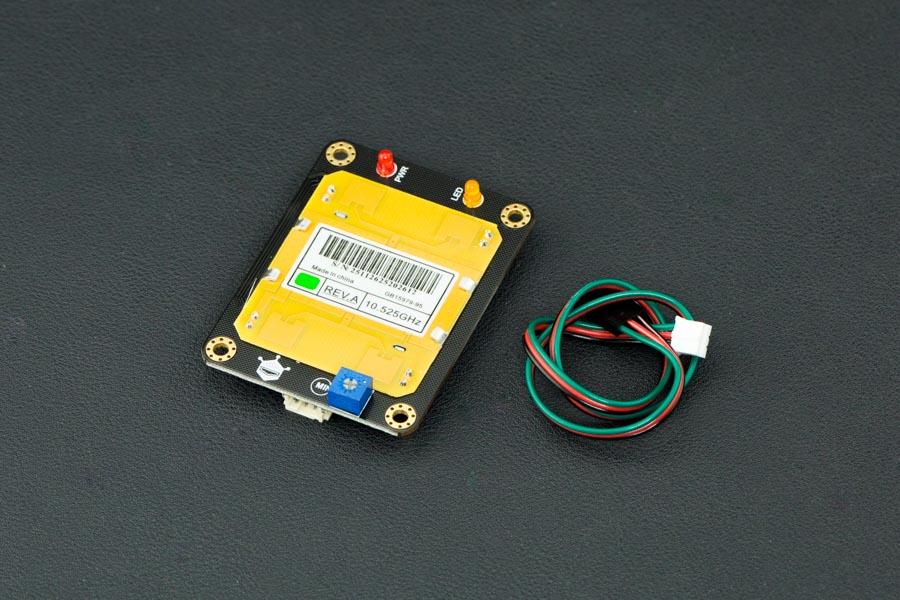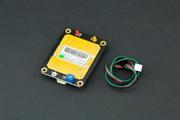DFRobot Gravity: Digital Microwave Sensor (Motion Detection)

Description
The microwave sensor applies the Doppler effect to detect moving objects using microwaves. This differs from the method used by a regular infrared (IR) sensor as microwave is sensitive to a variety of objects that are microwave-reflective, and its sensor readings are not affected by the ambient temperature.
This type of microwave sensor is widely used in industrial, transportation and civil applications such as measuring vehicle speed, liquid levels, automatic door motion detection, automatic washing, production line material detection and car reversing sensors etc.
The microwave detection method has the following advantages compared to other methods:
This type of microwave sensor is widely used in industrial, transportation and civil applications such as measuring vehicle speed, liquid levels, automatic door motion detection, automatic washing, production line material detection and car reversing sensors etc.
The microwave detection method has the following advantages compared to other methods:
- Non-contact detection
- Readings not affected by temperature, humidity, noise, air, dust or light - suitable for harsh environments
- Strong resistance to radio frequency interference
- Low output, unharmful to human
- Wide detection range and high velocity
- Supports non-living object detection
- Working Voltage: 5V + 0.25V
- Working Current (CW): 60mA max., 37mA typical
- Interface: Gravity 3-Pin interface(Digital)
- Size: 48.5x63mm
- Emission parameters:
- Detection Distance: 2-16M continuously adjustable
- Emission Frequency: 10.525 GHz
- Precision Frequency Setting: 3MHz
- Output Power (minimum): 13dBm EIRP
- Harmonic Emission: < -10dBm
- Average Current (5%DC): 2mA typ.
- Pulse Width (Min.): 5uSec
- Load Cycle (Min.): 1%
- Reception Parameters:
- Sensitivity:(10dB S/N ratio) 3Hz to 80Hz
- Bandwidth: -86dBm
- 3Hz to 80Hz Bandwidth Clutter: 10uV
- Antenna Gain: 8dBi
- Vertical 3dB Beam Width: 36 degrees
- Level 3dB Beam Width: 72 degrees
Properties
Brand information
| Brand | DFRobot |
| Model | SEN0192 |
€ 11,00€ 9,10 Excl. VAT (NL)
+ + =
Frequently bought together Total price:
Alternative products
- SparkFun Human Presence Sensor Breakout - AK9753 (Qwiic) € 27,50 View product
- Opencircuit Radar motion detection sensor module, 3.3V - 20V € 5,30 View product
- In stock DFRobot MmWave - Human Presence Detection Sensor (9 Meters) € 35,50 View product
- DFRobot 24GHz Microwave Radar Sensor € 89,25 View product
Customer questions
Q
Customer Reviews
DFRobot Gravity: Digital Microwave Sensor (Motion Detection) ★★★★★Click a star to leave your review
Suggested products
- In stock Opencircuit 6-DOF (gyroscope and accelerometer) module (GY-521) € 3,40 View product
- In stock Opencircuit Infrared receiver and remote control kit € 3,20 View product
- In stock Opencircuit HC-SR04 Ultrasonic distance detection module € 2,15 View product
- Opencircuit PIR motion detection module € 1,85 View product
- In stock Opencircuit NodeMcu v3 Lua ESP-12E WIFI Development Board € 5,80 View product
- Opencircuit Gift card View product
- 2 pieces Velleman Connection leads 100 cm (3.3 ft) - 4 mm (3/16") - 2 pcs - 30 v / 6 a € 8,30 View product
- Raspberry Pi USB micro-B to USB-C adapter (Black) € 2,40 View product
- DFRobot Gravity: 27 Pcs Sensor Set for Arduino € 97,75 View product
- DFRobot Micro:Maqueen Plus V2 - Ni-MH - an Advanced STEM Education Robot for micro:bit (without micro:bit) € 61,- View product
- In stock Opencircuit ZVP3306A Power MOSFET, P Channel, 60V, 160mA, 14 Ohms, E Line - Through Hole € 2,70 View product
- In stock BBC micro:bit v2.21 € 17,80 View product
- 10 pieces DFRobot Gravity: 4Pin I2C/UART Sensor Cable (10pcs) € 7,50 View product
- In stock LilyGO TTGO T-Higrow LoRa Shield - 868MHz € 8,45 View product
- Sparkfun Jumper Wires Premium 10cm M/M - 26 AWG (30 Pack) € 4,60 View product
- In stock DFRobot Lipo Charger-Type C € 7,25 View product
- In stock DFRobot EL Wire - Red - 1 meter € 9,- View product
- In stock DFRobot ABS Transparent Case for Arduino UNO R3 (LEGO Compatible) € 5,- View product
- In stock DFRobot Gravity: DHT22 Temperature & Humidity Sensor € 11,- View product
- Reduced In stock -9 % DFRobot Gravity: Digital Piezo Disk Vibration Sensor € 6,05 € 5,50 View product
- In stock DFRobot Gravity: Flexible Piezo Film Vibration Sensor € 7,60 View product
- Reduced In stock -65 % DFRobot Gravity: Gesture & Touch Sensor € 13,95 € 4,85 View product
- In stock DFRobot Gravity: I2C BME680 Environmental Sensor € 23,25 View product
- 10 pieces In stock DFRobot Gravity: Analog Sensor Cable for Arduino - 50cm (10 Pack) € 8,- View product
- 10 pieces In stock DFRobot Gravity: 4Pin I2C/UART Sensor Cable for Arduino - 50cm (10 Pack) € 8,- View product
- In stock DFRobot Prototyping Plate (Square) € 10,50 View product
- In stock DFRobot DF9GMS 360 Degree Micro Servo (1.6Kg) € 5,- View product
- In stock DFRobot Gravity: Digital 10A Relay Module € 5,- View product
- In stock DFRobot Maqueen Lite V5 micro:bit Robot Kit for STEM (Line Tracking & Obstacle Avoidance) € 41,75 View product
- In stock DFRobot Brushless DC Motor MTO1804 (CCW) € 35,50 View product










